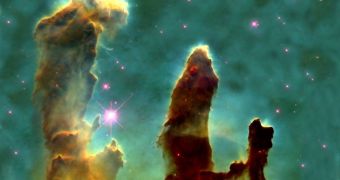For a long time we have been asking ourselves whether we are alone in the universe. The truth is that we still do not know the answer to this question, however there is a high probability that there are other life forms besides those on Earth. After all, for all we know the universe may be infinite in space-time. Nevertheless, the odds finding alien life in the universe, especially on planets similar to Earth, are relatively low.
Professor Andrew Watson, from the University of East Anglia, believes that this is because life takes such a long time to evolve. Earth was created about 4.6 billion years ago, yet life as we know it has been present on our planet for only a small fraction of that time. Intelligent life evolved only recently, through a process involving numerous small difficult evolutionary steps. By creating a mathematical model of the probability of these steps occurring in relation to the time since life has been present on Earth, Professor Watson was able to cast some light on the evolution of intelligent life.
On of the most critical parameters in his model is the habitability of an Earth-like planet orbiting a star similar to our Sun. Clearly, the habitability is limited by the Sun's brightness. Our Sun, for example, has been shinning light for the last 5 billion years or so, however, in four billion years, the Earth will no longer be habitable.
"The Earth's biosphere is now in its old age and this has implications for our understanding of the likelihood of complex life and intelligence arising on any given planet. At present, Earth is the only example we have of a planet with life. If we learned the planet would be habitable for a set period and that we had evolved early in this period, then with a sample of one, we'd suspect that evolution from simple to complex and intelligent life was quite likely to occur."
"By contrast, we now believe that we evolved late in the habitable period, and this suggests that our evolution is rather unlikely. In fact, the timing of events is consistent with it being very rare indeed," explains Professor Watson.
In the case of humans, there would be four evolutionary steps that have occurred for us to become self-aware and intelligent: the appearance of single-celled bacteria, complex cells, specialized cells to create complex structures and intelligent life with an established language.
"Complex life is separated from the simplest life forms by several very unlikely steps and therefore will be much less common. Intelligence is one step further, so it is much less common still," said Professor Watson.
According to his model, if the process of evolution of life on Earth were to start from scratch again, the probability of the last steps ever occurring is less than 10 percent, which translates into a probability of 0.01 percent of intelligent life evolving over a period of four billion years.

 14 DAY TRIAL //
14 DAY TRIAL //